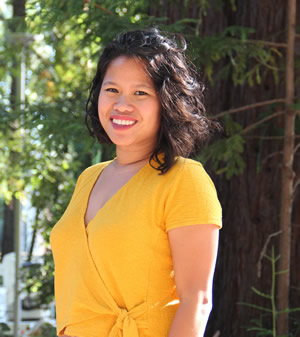Apple VollmersBy Nik Tsotakos
Apple currently studies a long noncoding RNA called GAPLINC. “It’s been previously characterized in gastric cancer, but we’re finding a new role for it in controlling the immune response. One of the major causes of death worldwide is sepsis—the immune response going haywire,—yet we still do not understand the underlying mechanisms that lead to fatality. GAPLINC’s role in regulating endotoxic shock can be a potential new avenue for future therapy development.” Apple didn’t follow a traditional path to grad school. “Being an immigrant from the Philippines and raised as the youngest of six children by a single mother, the path to obtaining a college degree was complicated, especially for a first-generation student like me,” Apple explained. “Upon graduating from college, I was offered a full-time position to continue working at Sanford Burnham. At this time, after the postdoc who initially trained me relocated to a sister campus, I became the sole person optimizing and running screens for the lab. In 4 years, I was promoted to the highest position possible with a bachelor’s degree, which was what inspired me to apply for graduate school. I applied to graduate schools, but after several rejections, I convinced myself that I was not meant to pursue a career in science. I decided to do a Master of Arts in Teaching with Credentialing and became a mathematics teacher at a high school in eastside San Jose. In my fourth year of teaching, my high school hosted José Hernández, a motivational speaker. He shared his story of repeated rejections before obtaining his dream job as a NASA astronaut, reminding me of my graduate school rejections. His story helped me realize that rejection should not stop me from pursuing my goals, and so I decided to re-apply to graduate school and accepted into the Molecular Biology program at UC Santa Cruz.”
However, after a four-year break, returning to college also brought some insecurities and uncertainty. Apple recalled, “I was returning to science after a four-year break and felt I was at a disadvantage to many of my classmates who seamlessly transitioned into graduate school directly from undergraduate programs.” She overcame these difficulties by tapping into her prior personal and professional experiences and remembered “my first experience in the lab where I initially made plenty of mistakes, but I always maintained an enthusiasm for my project and letting my curiosity drive the research.” She continued, “One thing that has made graduate training a much better experience for me has been to surround myself with a great community of people who trust and support one another. Also take care of yourself: don’t feel guilty for taking the time to eat right, exercising, and getting a good night’s sleep.” Apple goes beyond just offering advice to her peers. With funds from her 2019 HHMI Gilliam Fellowship (which are to be used to promote diversity and inclusion), she established the first graduate student peer-mentor program at UC Santa Cruz called the Science Support Network, or SSN. She explained, “this program pairs experienced graduate students with first-year graduate students to guide them through their courses, qualifying exams, and initial transition to graduate school. I hope that this program addresses the feelings of stress, inadequacy, or uncertainty that most students experience during graduate school, myself included, and helps them gain the confidence to continue doing the work they love.” HHMI diversity and inclusion funds also support conference travel grants to graduate students with children, “as they often can find it challenging to juggle the cost of travel and childcare, with childcare opportunities at conferences limited or nonexistent.” She emphasized, “Conference expenses and the added burden of securing childcare can be a barrier to many students, who simply end up not attending.” That brings a disadvantage and can negatively impact future career opportunities. “Networking is an essential part of science; therefore, we must make opportunities for travel conferences more accessible for graduate students with children,” she emphasized. Unfortunately, COVID-19 put a speed bump in her plans for attending her first in-person RNA meeting, but Apple has registered for RNA 2020, which will be held online. “I’m looking forward to what I’m sure will be an amazing experience.” You can find Apple Vollmers on Twitter as @AppleVollmers. Her favorite RNA is “a lncRNA called THOR. I’m a huge Marvel fan, so obviously, this RNA conjures images of Chris Hemsworth.” |

 Apple Cortez Vollmers is a graduate student in the lab of Susan Carpenter and both an HHMI Gilliam and a Ford Predoctoral Fellow. She received her B.S. in Bioengineering from the University of California, San Diego (UCSD). Apple’s interest in RNA Biology and the proximity of family in the San Francisco Bay area led her to University of California Santa Cruz (UC Santa Cruz) for graduate school—which she calls as the “home to the Center for Molecular Biology of RNA with the largest grouping of RNA laboratories in the world.”
Apple Cortez Vollmers is a graduate student in the lab of Susan Carpenter and both an HHMI Gilliam and a Ford Predoctoral Fellow. She received her B.S. in Bioengineering from the University of California, San Diego (UCSD). Apple’s interest in RNA Biology and the proximity of family in the San Francisco Bay area led her to University of California Santa Cruz (UC Santa Cruz) for graduate school—which she calls as the “home to the Center for Molecular Biology of RNA with the largest grouping of RNA laboratories in the world.”